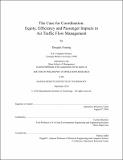| dc.contributor.advisor | Cynthia Barnhart. | en_US |
| dc.contributor.author | Fearing, Douglas (Douglas Stephen) | en_US |
| dc.contributor.other | Massachusetts Institute of Technology. Operations Research Center. | en_US |
| dc.date.accessioned | 2011-04-25T14:15:38Z | |
| dc.date.available | 2011-04-25T14:15:38Z | |
| dc.date.copyright | 2010 | en_US |
| dc.date.issued | 2010 | en_US |
| dc.identifier.uri | http://hdl.handle.net/1721.1/62310 | |
| dc.description | Thesis (Ph. D.)--Massachusetts Institute of Technology, Sloan School of Management, Operations Research Center, 2010. | en_US |
| dc.description | This electronic version was submitted by the student author. The certified thesis is available in the Institute Archives and Special Collections. | en_US |
| dc.description | Cataloged from student-submitted PDF version of thesis. | en_US |
| dc.description | Includes bibliographical references (p. 121-123). | en_US |
| dc.description.abstract | In this thesis, we develop multi-resource integer optimization formulations for coordinating Traffic Flow Management (TFM) programs with equity considerations. Our multi-resource approaches ignore aircraft connectivity between flights, but allow a single flight to utilize multiple capacity-controlled resources. For example, when both Ground Delay Programs (GDPs) and Airspace Flow Programs (AFPs) are simultaneously in effect, a single flight may be impacted by a GDP and one or more AFPs. We show that due to the similarity with current practice, our models can be applied directly in the current Collaborative Decision-Making (CDM) environment. In the first part of the thesis, we develop these formulations as extensions of a well-studied, existing nationwide TFM formulation and compare them to approaches utilized in practice. In order to make these comparisons, we first develop a metric, Time-Order Deviation, for evaluating schedule fairness in the multi-resource setting. We use this metric to compare approaches in terms of both schedule fairness and allocated flight delays. Using historical scenarios derived from 2007 data, we show that, even with limited interaction between TFM programs, our Ration-by-Schedule Exponential Penalty model can improve the utilization of air transportation system resources. Skipping ahead, in the last part of the thesis, we develop a three-stage sequential evaluation procedure in order to analyze the TFM allocation process in the context of a dynamic CDM environment. To perform this evaluation we develop an optimization-based airline disruption response model, which utilizes passenger itinerary data to approximate the underlying airline objective, resulting in estimated flight cancellations and aircraft swaps between flight legs. Using this three-stage sequential evaluation procedure, we show that the benefits of an optimization-based allocation are likely overstated based on a simple flight-level analysis. The difference between these results and those in the first part of the thesis suggests the importance of the multi-stage evaluation procedure. Our results also suggest that there may be significant benefits to incorporating aircraft flow balance considerations into the Federal Aviation Administration's (FAA's) TFM allocation procedures. The passenger itinerary data required for the airline disruption response model in the last part of the thesis are not publicly available, thus in the second part of the thesis, we develop a method for modeling passenger travel and delays. In our approach for estimating historical passenger travel, we develop a discrete choice model trained on one quarter of proprietary booking data to disaggregate publicly available passenger demand. Additionally, we extend a network-based heuristic for calculating passenger delays to estimate historical passenger delays for 2007. To demonstrate the value in this approach, we investigate how passenger delays are affected by various features of the itinerary, such as carrier and time of travel. Beyond its applications in this thesis, we believe the estimated passenger itinerary data will have broad applicability, allowing a passenger-centric focus to be incorporated in many facets of air transportation research. To facilitate these endeavors, we have publicly shared our estimated passenger itinerary data for 2007. | en_US |
| dc.description.statementofresponsibility | by Douglas Fearing. | en_US |
| dc.format.extent | 123 p. | en_US |
| dc.language.iso | eng | en_US |
| dc.publisher | Massachusetts Institute of Technology | en_US |
| dc.rights | M.I.T. theses are protected by
copyright. They may be viewed from this source for any purpose, but
reproduction or distribution in any format is prohibited without written
permission. See provided URL for inquiries about permission. | en_US |
| dc.rights.uri | http://dspace.mit.edu/handle/1721.1/7582 | en_US |
| dc.subject | Operations Research Center. | en_US |
| dc.title | The case for coordination : equity, efficiency and passenger impacts in air traffic flow management | en_US |
| dc.title.alternative | Equity, efficiency and passenger impacts in air traffic flow management | en_US |
| dc.type | Thesis | en_US |
| dc.description.degree | Ph.D. | en_US |
| dc.contributor.department | Massachusetts Institute of Technology. Operations Research Center | |
| dc.contributor.department | Sloan School of Management | |
| dc.identifier.oclc | 710835184 | en_US |
